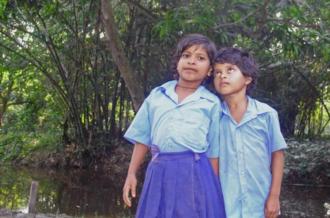Mango trees to the rescue of Indian girls
Villagers in Dharhara in eastern India plant mango trees every time a daughter is born to secure financial future.

Anil Singh planted 11 mango trees when he was blessed with a daughter more than two-years ago. He planted 10 more recently, keeping his daughter Anjali in mind.
In doing so, he was simply following a deep-rooted tradition of Dharhara village in the eastern Indian state of Bihar, where fruit-bearing trees are grown to secure the future of every female child.
The fruit and trees can be sold later, generating income and helping to pay for the girl’s education and marriage. “They are an insurance for a secured future,” boasts Singh.
It has been a noble practice with little parallel in a country where girls are less than safe. Female foeticide routinely snuffs out life even before birth. Those who live to grow often have to contend with life-long discrimination, marital abuse at home, and sexual harassment outside.
Fortunately though, Dharhara has not been afflicted by the same evils. Roads leading to the dusty village are bumpy and treacherous. It has possibly helped to keep the scourges away.
“The birth of a girl child is celebrated in my village,” says Sulakshana Kumari, a resident. “We sing songs when a child is born and plant mango trees. These trees are our family.”
So every time a girl is born in the village, a few mango trees are planted.
Two-and-a-half-year-old Anjali has now 21 trees standing tall – all securing her well-being. The fruit that the trees will bear will perhaps pay for her education. A few trees may be sold to organise her wedding, and in the distant future when she herself has children, some trees would come in handy to nurture them.
As the trees have grown, so has the fame of the village.
Twin purposes
Nitish Kumar, the chief minister of the province, has visited Dharhara for three consecutive years on the World Environment Day.
“The villagers of Dharhara have served two purposes by their novel practice – that of the environmental conservation and gender sensitivity,” he told the DNA newspaper.
More importantly, the village’s collective effort in planting trees is bearing fruit: Dharhara has a higher female-male ratio than the national average. It currently stands at 957 for every 1,000 males, compared to the country average of 940 per 1,000 males.
 |
| There has been no case of violence against women in the village in recent years [Al Jazeera] |
Even village elders can’t recollect a single act of violence against women or deaths due to dowry (a practice where the bride’s family is expected to give money and gifts to the groom) in the village in recent times.
Dharhara’s zero-crime record against women has won plaudits from top police officials of the state.
Sekhar Kumar, the superintendent of police of Nabgachia police district, says he has not come across any incident of crimes against women in the village during his tenure.
“The village of Darhara is very conscious about its social respect and reputation, and it can become a role model for rest of India,” he says.
Villagers say the tradition of planting mango trees started by their forefathers some 200 years ago has struck deep roots.
“Mango trees enjoy a prized place in the village as we take pride in our daughters,” says a villager.
Love for daughters
Agrees 23-year-old Minakshi, a villager who grew up with the tradition.
“I do not remember ever being shouted at by my parents. In fact I have received only love and affection from my family and also from everyone in the village.”
“Love is all we have for our daughter,” says her mother Neelam.
The word of Dharhara’s special love for daughters has spread, and Neelam one day found a new born girl child lying unattended under a mango tree.
 |
| Anshu found a new home and a new mother in Dharhara village [Al Jazeera] |
The baby was deserted after her parents possibly felt that she would be better off in Dharhara.
Neelam adopted the child, now christened Anshu, and quickly planted 10 mango trees in line with the village tradition.
Over the years, the mango planting for girls has gained momentum and broken down even caste barriers. In large tracts of India, those deemed to have been born in lower castes are discriminated against and deprived of equal rights.
Dharhara, however, makes no such distinction.
“People from any caste and those with no land can also plant trees,” says Shrinandan Singh, a former village head.
“Everyone is free to plant trees where they find space, even by the road side.”
As more and more mango trees dot the village landscape, the girls of Dharhara are daring to dream.
Minakshi, the 23-year-old, is busy planning her future. She is getting married and her mother Neelam has just sold a mango tree that she inherited from her grandmother for about $800 to pay for her wedding.
Looking at the majestic mango trees, other villagers take solace that their daughter’s future are secured.
So how many trees have the villagers planted so far?
“We have lost count. It is something we have been doing for generations,” says the ex-village head Shrinandan Singh. Whatever be the numbers, there is little to doubt that mango trees have come to the rescue of girls in Dharhara village.
Follow Kamal on Twitter: @kamalpkumar